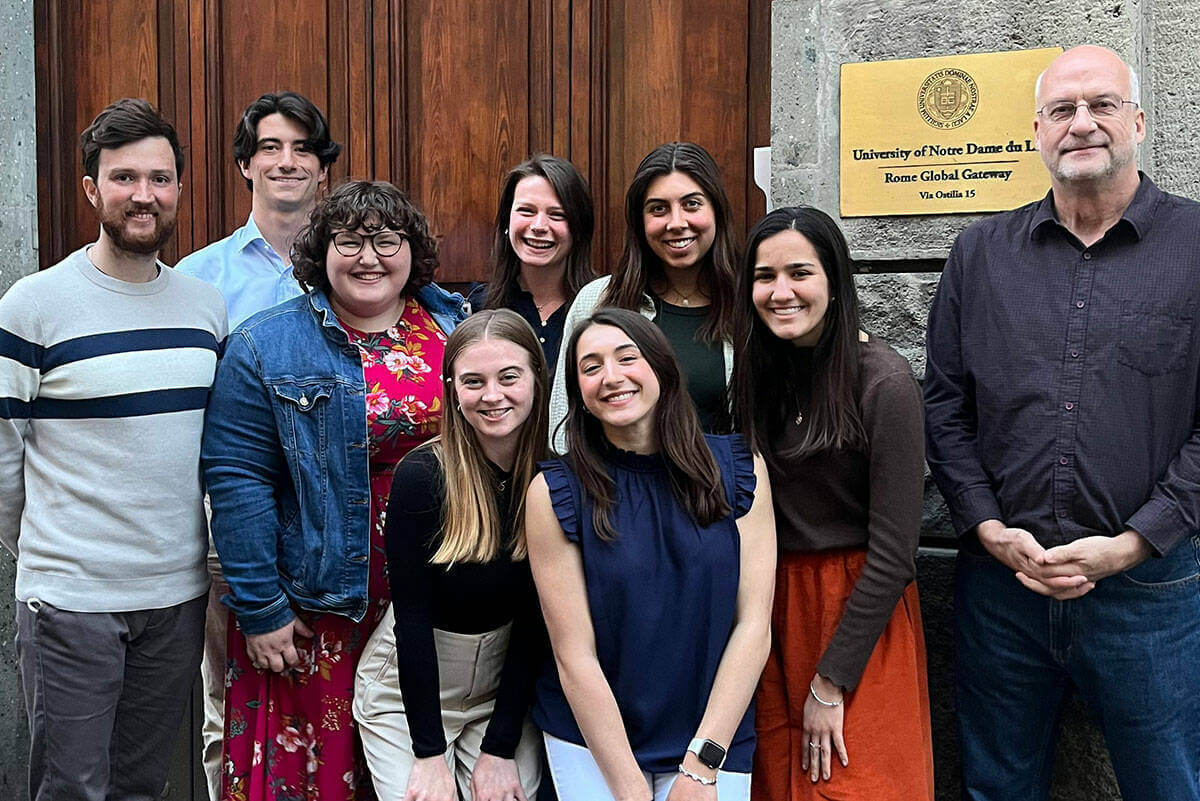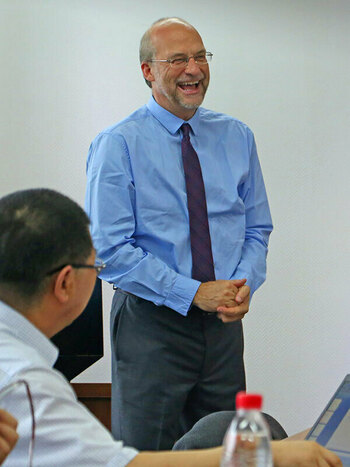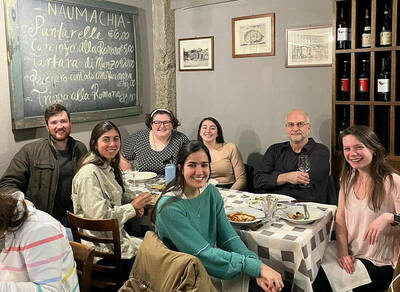
Fewer Americans have identified as a member of a religion over the last 30 years, and Notre Dame sociologist Christian Smith is working to explain why.
With the help of five undergraduates and one graduate student, this research is the centerpiece of a first-of-its-kind class at the University’s Rome Global Gateway that is culminating with a two-day symposium in April with Vatican officials and European scholars.
“We know from survey data and other studies that younger adults in the United States have become detached from traditional religion — even in ways Baby Boomers have not,” said Smith, the William R. Kenan Jr. Professor of Sociology. “This project tries to understand what happened.”
The research effort to examine contributing factors of this new religious reality is supported by the inaugural year of the Rome Fellows Program, a College of Arts & Letters initiative designed to pair intense undergraduate research experience with an ongoing question a faculty member is interested in exploring further.
The 12-month program, led by the Pizzo Family Rome Senior Research Fellow, will annually give students the chance to work collaboratively on a significant research question, spending time in a class on campus in the fall and advancing research in Rome in the spring.
“Much of what undergrads usually consume is the final results of research. Here, they’re getting thrown in from the beginning to see the process unfold over time,” Smith said. “Very few undergraduates in the country get this big-picture, long-term experience.”
“Much of what undergrads usually consume is the final results of research. Here, they’re getting thrown in from the beginning to see the process unfold over time. Very few undergraduates in the country get this big-picture, long-term experience.”
‘A huge phenomenon’
The research effort began last year on campus, with students conducting 200 in-person interviews focused on the human side of what people believe and how the world shapes religion through politics, families, and communities.
For the historical perspective of this trend, the team has been analyzing 30 sociological developments. The early 1990s is a key starting point, as that timeframe covers the post-Cold War world and the rise of the internet. Another focal point is the terrorist attacks on Sept. 11, 2001 — a time when religion and violence intersected in news coverage, and the mass casualties and subsequent overseas conflicts shaped beliefs.

“Traditional religion started to bomb out with younger adults — beginning with Gen Xers and Millennials and continuing with Gen Z,” Smith said. “This involved the growth of Americans identifying as ‘not religious.’ That’s grown since 1991, and especially in young Americans. The growth of ‘spiritual but not religious’ has become a huge phenomenon.”
To explain the drop-off, Smith and the students are examining music, pop culture, and the public fascination with vampires, werewolves, witchcraft, and UFOs. The growing interest in mindfulness, which is now part of corporate culture and mental-health support, will also be explored.
The team is also considering how the internet’s creation and rapid growth changed the way people think about authority, communication, news, information, and what it means to have a community.
“Nobody has put it all together, but I hope our research and its findings will help the Church come to grips with the profundity of the situation, the dire straits it’s in,” Smith said. “There is a pope right now who seems to have some sense that things need to change. As a sociologist, I’m not here to tell the Church what it needs to do. I’m just trying to provide fact-based information on what’s going on in the world.”
‘The more brains … the better’
Smith has especially enjoyed the opportunity that serving as the inaugural Pizzo Family Rome Senior Research Fellow has provided to work with the same group of students over a 12-month period.
“They’re just so good,” he said. “It’s fun to teach in a class for 14 weeks, but then the semester is over, and we have a whole new class of students. That’s university life. But this is a great opportunity to get to know undergrads, and they see what a professor’s life is like. The Rome program is already amazing as it is. This just adds a whole other dimension and layer.”

Sociology Ph.D. student Matt Coetzee described the program as an unparalleled opportunity for students to be involved in a project that is this expansive in scope.
“It’s really unique for undergrad exposure,” said Coetzee, a native of South Africa who appreciates that his daily commute in Rome leads him past the Colosseum. “It’s so great for critical thinking and their engagement in really tackling bigger sociological and life questions. This is how knowledge gets generated. It’s a messy process and a creative process that gets filtered. And the more brains you have working on it, the better.”
For sophomore Mary Grace Walsh, the project has been a perfect blend of her theology and sociology majors and reshaped the way she thinks about research. The experience has helped her develop many valuable skills and build strong relationships with mentors and friends, and she’s now already planning her senior thesis on disability and religion.
“I didn’t realize that academic research could be so formative, even for a student who has little interest in a future career in academia,” Walsh said. “This program has profoundly shaped my academic life and my Notre Dame experience for the better.”
The research project will vary every year, based on the research question the Pizzo fellow chooses to explore. As designed, it will conclude with a symposium that brings together Church officials, journalists, and scholars throughout Rome and the rest of Italy and Europe.
“We’re engaging people in the Church — especially in the Vatican — for a day to have a big conversation about what the research project is about,” Smith said. “If this succeeds, Notre Dame faculty, as scholars, are learning things that can contribute to the knowledge of leaders in the Church — things they should know and be interested in learning about and hearing about.”
“If this succeeds, Notre Dame faculty, as scholars, are learning things that can contribute to the knowledge of leaders in the Church — things they should know and be interested in learning about and hearing about.”


